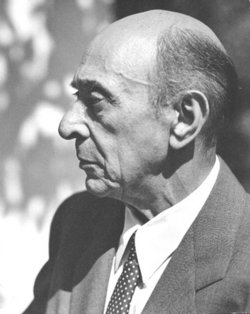Schoenberg in Boston
 This weekend saw the most hotly contested program of the Boston Symphony Orchestra’s 125th anniversary season thus far. However, the ruckus was not due to a lack of available tickets. As part of James Levine’s ongoing project - juxtaposing the works of Beethoven and Schoenberg - the BSO offered a concert bill spotlighting three major orchestral works of the 20th-century icon. This concert was set to match a previous all-Beethoven program (a snow date of which can be caught on February 26) in which the Triple Concerto was presented with the 2nd and 7th Symphonies. Unlike the all-Beethoven, as one could expect, the all-Schoenberg performance elicited ill feelings from subscribers. The Boston Globe reported that over 750 subscription tickets had been returned to the box office. The Globe, however, did not specify how many tickets were actually returned in disgust, how many were traded for other concerts, as is an option for subscribers, or the percentage of those returned tickets that had been picked up in single ticket sales – a growing trend for the BSO this season. Nevertheless, the Globe’s writers - the venerable Richard Dyer being one of them - did their best last week to try to educate the populace in the richness of Schoenberg’s music. As seems to always happen, these attempts eventually fell back to the “accessibility” argument but generally concluded that music must be heard and digested before a determination should be made.
This weekend saw the most hotly contested program of the Boston Symphony Orchestra’s 125th anniversary season thus far. However, the ruckus was not due to a lack of available tickets. As part of James Levine’s ongoing project - juxtaposing the works of Beethoven and Schoenberg - the BSO offered a concert bill spotlighting three major orchestral works of the 20th-century icon. This concert was set to match a previous all-Beethoven program (a snow date of which can be caught on February 26) in which the Triple Concerto was presented with the 2nd and 7th Symphonies. Unlike the all-Beethoven, as one could expect, the all-Schoenberg performance elicited ill feelings from subscribers. The Boston Globe reported that over 750 subscription tickets had been returned to the box office. The Globe, however, did not specify how many tickets were actually returned in disgust, how many were traded for other concerts, as is an option for subscribers, or the percentage of those returned tickets that had been picked up in single ticket sales – a growing trend for the BSO this season. Nevertheless, the Globe’s writers - the venerable Richard Dyer being one of them - did their best last week to try to educate the populace in the richness of Schoenberg’s music. As seems to always happen, these attempts eventually fell back to the “accessibility” argument but generally concluded that music must be heard and digested before a determination should be made.
The BSO, for its part, has tried to present its case for the pairing of Beethoven and Schoenberg in its “online conservatory,” which provides detailed analyses of the pieces chosen for each program, in addition to various essays about, specifically, Schoenberg, his life, and his work. Finally, printed in this concert’s program is an extensive interview with Levine, detailing his motivation behind the specific coupling of these two composers. The main point, Levine thinks, is the extraordinary development of their respective compositional languages (in a relatively short time) and the reverberating effects of their innovations. In the end, the hype didn’t seem to work. By all accounts, the performances (including the one reviewed here) were not well attended.
Richard Dyer, Schoenberg program is a winner (Boston Globe, February 18) T. J. Medrek, Levine, BSO measure composer on scale with greats (Boston Herald, February 18) |
As Levine’s thematic programming charges through the rest of this season and into the next, the most comforting thought is that these rarely programmed pieces can be heard by an orchestra of such class and ability. Whether or not the audiences can handle such programming on a longterm basis remains to be seen.
The next installment of the project is Schoenberg’s Gurrelieder, February 23 – 25. All the details of the BSO’s upcoming east coast tour, which includes a stop at the Kennedy Center, can be found in a recent press release.




















































